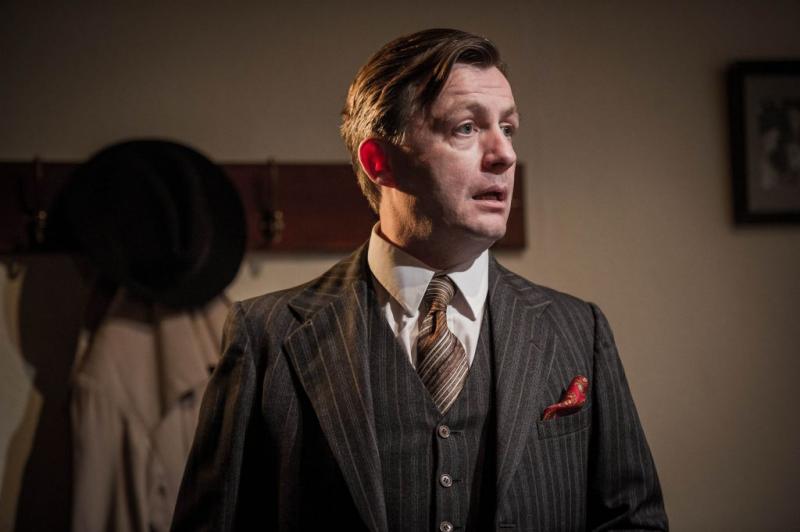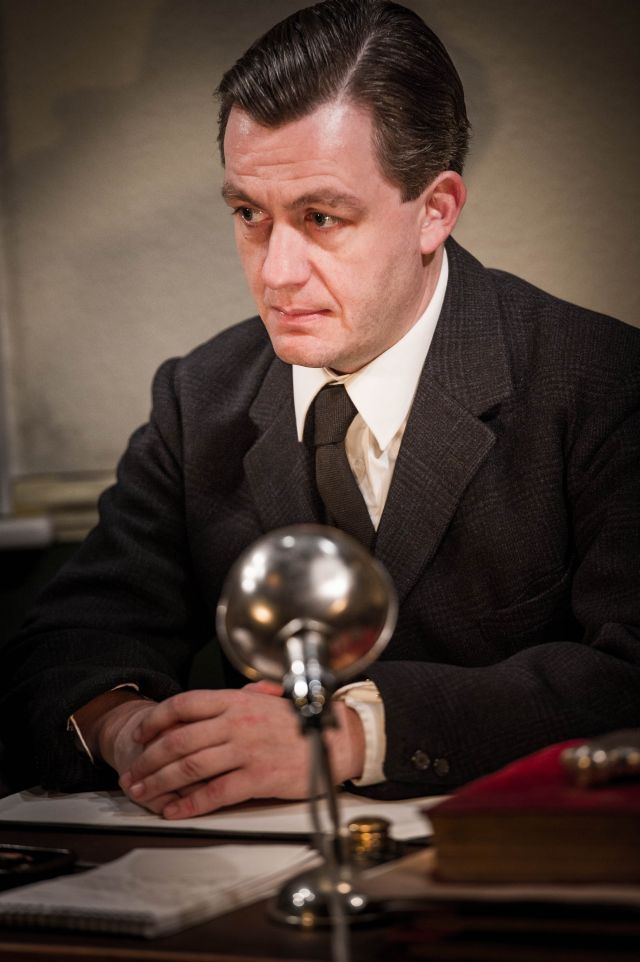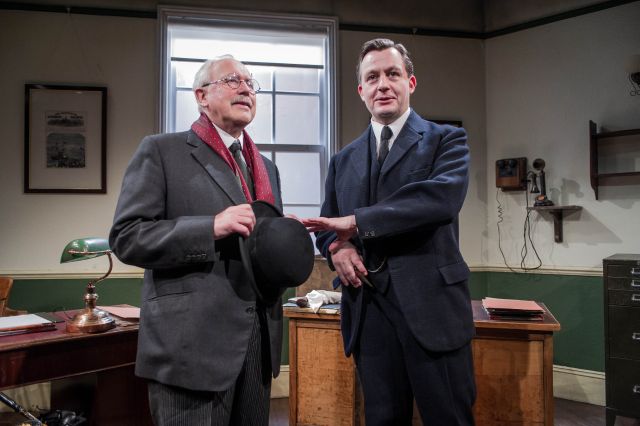Cornelius, Finborough Theatre | reviews, news & interviews
Cornelius, Finborough Theatre
Cornelius, Finborough Theatre
JB Priestley discovery brings theatrical relic to revelatory life

Accolades are due again for the tiny Finborough Theatre, whose production of JB Priestley's all-but-unknown Cornelius constitutes the most exciting reclamation from the English theatrical canon since the same venue produced Emlyn Williams's startling and welcome Accolade some 18 months ago.
Priestley wrote the play for his friend and frequent muse Ralph Richardson, and one can hear the late actor-knight's quirky sonorities hovering over a text that couples jauntiness with despair, grand bursts of gusto with painful moments of Chekhovian self-realisation that, as with the Russian master, arrive on occasion accompanied by a gun. (No revealing here whether said weapon gets used or not.) Set entirely within a Holborn-based aluminium import business on the brink of financial collapse, Cornelius the play shows us Jim Cornelius the business partner as he exists in the company of importuning salespeople, fed-up creditors, and possible amours, his office an increasingly spartan pressure cooker capable of pushing its inhabitants toward the grave.
 We quickly adjust to the play's world of dodged telephone calls and dodgy invoices, abstract chat about "the system" coupled with the spanner thrown into office realpolitik by new shorthand-typist Judy, sister of an errant employee who has gone up north to tend to the husband that Cornelius didn't know she had. Indeed, remarking upon the unseen husband's "pneumonia in Newcastle", Alan Cox in the title role (pictured right) makes this particular affliction sound worthy of Oscar Wilde, even as his terrific star turn tilts elsewhere towards a fantasist in freefall.
We quickly adjust to the play's world of dodged telephone calls and dodgy invoices, abstract chat about "the system" coupled with the spanner thrown into office realpolitik by new shorthand-typist Judy, sister of an errant employee who has gone up north to tend to the husband that Cornelius didn't know she had. Indeed, remarking upon the unseen husband's "pneumonia in Newcastle", Alan Cox in the title role (pictured right) makes this particular affliction sound worthy of Oscar Wilde, even as his terrific star turn tilts elsewhere towards a fantasist in freefall.
Something of an equivalent Yelena within the Uncle Vanya rewrite that Cornelius at times suggests, Judy is played with real charm by a sweet-faced Emily Barber, whose lilting way with a song does what it can to forestall the incipient collapse surrounding the firm of Briggs and Murrison to which Cornelius belongs. (David Woodhead's clever wraparound set - its contents gradually depleted - adjusts the firm's name accordingly by the time of the third and most decisive act.)
 The play throughout shows its characters indulging flights of fancy or of the imagination and then being brought down to earth, all reminders of the play-acting required by life folded neatly into a narrative in which abundant reckonings await. Col Farrell (pictured with Cox) is lovely as the devoted cashier who has to be gently urged towards a new life but not before seeking out two estimates for his eventual cremation; one evidently can never be too prepared. Back in Vanya-land, Annabel Topham comes readily by the Sonya-like admissions of affection that mark out Miss Porrin, the starchy yet adoring employee who offers herself as the antidote to Cornelius's loneliness, and Jamie Newall brings an unnerving perturbation to the role of Murrison, the business partner-turned-paranoiac who returns to London from his travels a broken man.
The play throughout shows its characters indulging flights of fancy or of the imagination and then being brought down to earth, all reminders of the play-acting required by life folded neatly into a narrative in which abundant reckonings await. Col Farrell (pictured with Cox) is lovely as the devoted cashier who has to be gently urged towards a new life but not before seeking out two estimates for his eventual cremation; one evidently can never be too prepared. Back in Vanya-land, Annabel Topham comes readily by the Sonya-like admissions of affection that mark out Miss Porrin, the starchy yet adoring employee who offers herself as the antidote to Cornelius's loneliness, and Jamie Newall brings an unnerving perturbation to the role of Murrison, the business partner-turned-paranoiac who returns to London from his travels a broken man.
Premiered in 1935, Cornelius communicates the era from which it sprang via such details as a passing reference to Hitler as well as office boy Lawrence's excitement at the age of the wireless and gramophone that lies in wait. (And via its bygone attitudes towards child labour: only 19, Lawrence, we learn, has worked for the firm for nearly five years.) In its feeling for the depredations of the workplace, the play at times seems as if it could have been retitled Waste, and so what if Harley Granville Barker got there first? But against the odds, Priestley backs away from the abyss that he opens up before us. Jim Cornelius believes in the co-existence of light alongside darkness and so, on this occasion, does Priestley, too.
rating
Share this article
The future of Arts Journalism
You can stop theartsdesk.com closing!
We urgently need financing to survive. Our fundraising drive has thus far raised £49,000 but we need to reach £100,000 or we will be forced to close. Please contribute here: https://gofund.me/c3f6033d
And if you can forward this information to anyone who might assist, we’d be grateful.

Subscribe to theartsdesk.com
Thank you for continuing to read our work on theartsdesk.com. For unlimited access to every article in its entirety, including our archive of more than 15,000 pieces, we're asking for £5 per month or £40 per year. We feel it's a very good deal, and hope you do too.
To take a subscription now simply click here.
And if you're looking for that extra gift for a friend or family member, why not treat them to a theartsdesk.com gift subscription?
more Theatre
 Hedda, Orange Tree Theatre review - a monument reimagined, perhaps even improved
Scandinavian masterpiece transplanted into a London reeling from the ravages of war
Hedda, Orange Tree Theatre review - a monument reimagined, perhaps even improved
Scandinavian masterpiece transplanted into a London reeling from the ravages of war
 The Assembled Parties, Hampstead review - a rarity, a well-made play delivered straight
Witty but poignant tribute to the strength of family ties as all around disintegrates
The Assembled Parties, Hampstead review - a rarity, a well-made play delivered straight
Witty but poignant tribute to the strength of family ties as all around disintegrates
 Mary Page Marlowe, Old Vic review - a starry portrait of a splintered life
Tracy Letts's Off Broadway play makes a shimmeringly powerful London debut
Mary Page Marlowe, Old Vic review - a starry portrait of a splintered life
Tracy Letts's Off Broadway play makes a shimmeringly powerful London debut
 Little Brother, Soho Theatre review - light, bright but emotionally true
This Verity Bargate Award-winning dramedy is entertaining as well as thought provoking
Little Brother, Soho Theatre review - light, bright but emotionally true
This Verity Bargate Award-winning dramedy is entertaining as well as thought provoking
 The Unbelievers, Royal Court Theatre - grimly compelling, powerfully performed
Nick Payne's new play is amongst his best
The Unbelievers, Royal Court Theatre - grimly compelling, powerfully performed
Nick Payne's new play is amongst his best
 The Maids, Donmar Warehouse review - vibrant cast lost in a spectacular-looking fever dream
Kip Williams revises Genet, with little gained in the update except eye-popping visuals
The Maids, Donmar Warehouse review - vibrant cast lost in a spectacular-looking fever dream
Kip Williams revises Genet, with little gained in the update except eye-popping visuals
 Ragdoll, Jermyn Street Theatre review - compelling and emotionally truthful
Katherine Moar returns with a Patty Hearst-inspired follow up to her debut hit 'Farm Hall'
Ragdoll, Jermyn Street Theatre review - compelling and emotionally truthful
Katherine Moar returns with a Patty Hearst-inspired follow up to her debut hit 'Farm Hall'
 Troilus and Cressida, Globe Theatre review - a 'problem play' with added problems
Raucous and carnivalesque, but also ugly and incomprehensible
Troilus and Cressida, Globe Theatre review - a 'problem play' with added problems
Raucous and carnivalesque, but also ugly and incomprehensible
 Clarkston, Trafalgar Theatre review - two lads on a road to nowhere
Netflix star, Joe Locke, is the selling point of a production that needs one
Clarkston, Trafalgar Theatre review - two lads on a road to nowhere
Netflix star, Joe Locke, is the selling point of a production that needs one
 Ghost Stories, Peacock Theatre review - spirited staging but short on scares
Impressive spectacle saves an ageing show in an unsuitable venue
Ghost Stories, Peacock Theatre review - spirited staging but short on scares
Impressive spectacle saves an ageing show in an unsuitable venue
 Hamlet, National Theatre review - turning tragedy to comedy is no joke
Hiran Abeyeskera’s childlike prince falls flat in a mixed production
Hamlet, National Theatre review - turning tragedy to comedy is no joke
Hiran Abeyeskera’s childlike prince falls flat in a mixed production
 Rohtko, Barbican review - postmodern meditation on fake and authentic art is less than the sum of its parts
Łukasz Twarkowski's production dazzles without illuminating
Rohtko, Barbican review - postmodern meditation on fake and authentic art is less than the sum of its parts
Łukasz Twarkowski's production dazzles without illuminating

Add comment